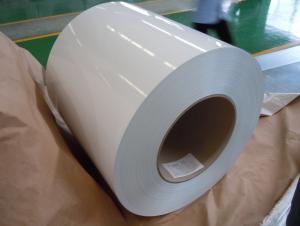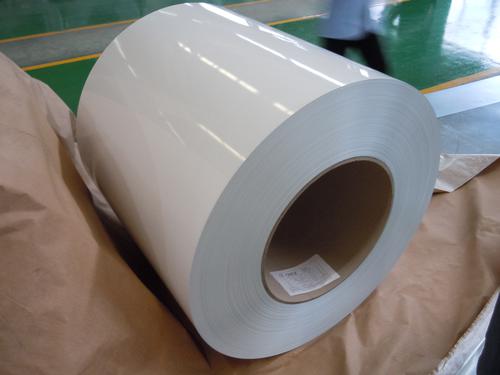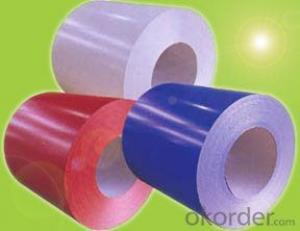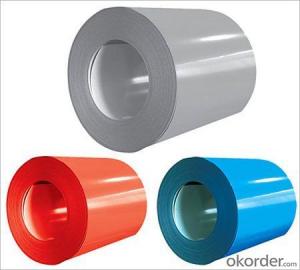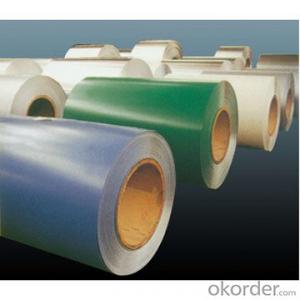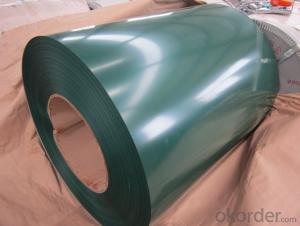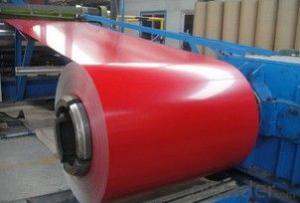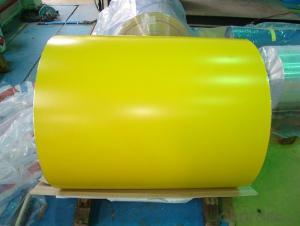PRE-PAINTED STEEL COIL
- Loading Port:
- China Main Port
- Payment Terms:
- TT OR LC
- Min Order Qty:
- -
- Supply Capability:
- -
OKorder Service Pledge
OKorder Financial Service
You Might Also Like
Product Description:
Prepainted galvanized color coated PPGI steel:
| Thickness | 0.12-1.2mm |
| Width: | 700-1250mm |
| Material: | SGCC,SGCD,SECC,SECD,DX51D+Z |
| Zinc coating: | 30-180G/M2 |
| Surface Structure: | galvanized ,zero spangle, regular spangle or normal spangle |
| COLOR: | RAL number or sample colour |
| Coating: | Topside: 5micron primer +15-20microns polyester Backside: 5-8microns primer epoxy. Surface treatment: chromated and oiled, chromated and non-oiled |
II Main characteristics :
1.strong corrosion resistance
2.surface quality
3.conducive to deep processing,such as corrugated steel sheet 4.economy and practicality
III Applications:
Household Appliance:
1.Refrigerator shutter &side panels, Washer, Freezers, Air conditions,
2.Rice Cooker, Microwave Ovens, Water Heaters, Sterilization Cabinets, Range Hoods
3.Computer Panels , DVD/DVB panels, TV back panel etc.
- Q: How are steel coils used in the production of agricultural systems?
- Due to their durability and strength, steel coils are frequently employed in the production of agricultural systems. Specifically, these coils are commonly utilized in the creation of machinery and equipment essential for agricultural operations. One prevalent use of steel coils lies in the manufacture of farming machinery such as tractors, plows, and cultivators. These machines necessitate robust components capable of enduring the challenging conditions present in the agricultural environment. Steel coils are employed to fabricate the frames, chassis, and other structural parts of these machines, providing the necessary strength and support. Additionally, steel coils are employed in the creation of irrigation systems, which play a crucial role in efficient water management within agriculture. These coils are employed in the construction of pipes, valves, and fittings, ensuring the durability and long-lasting nature of the irrigation system. Furthermore, steel coils are employed to fabricate storage tanks and silos, which serve as vital tools for storing and preserving agricultural products like grains, seeds, and fertilizers. Moreover, steel coils find application in the construction of greenhouses and agricultural buildings. These coils are used to fabricate the structural framework, providing stability and resistance against environmental factors. Steel coils are also employed in the production of fencing and enclosures to safeguard crops and livestock from external threats. In conclusion, steel coils play a significant role in the production of agricultural systems by delivering the necessary strength, durability, and stability required for farming machinery, irrigation systems, storage facilities, and agricultural structures. Their utilization ensures that these systems can withstand the demanding conditions of the agricultural industry and contribute to efficient and sustainable farming practices.
- Q: What are the advantages of using steel coils in construction?
- Using steel coils in construction offers several advantages. Firstly, they possess immense strength and durability, enabling them to withstand heavy loads and resist deformation. As a result, they are perfect for structural purposes such as beams, columns, and frames. Secondly, steel coils exhibit exceptional versatility. They can be easily shaped and molded into various forms, providing flexibility in design and construction. Steel coils can be rolled, bent, cut, and welded according to specific project requirements. This adaptability makes them suitable for a wide range of construction applications. Another benefit of utilizing steel coils in construction is their resistance to corrosion. To prevent rusting and corrosion, steel coils are often coated with protective substances like galvanized or stainless steel. This ensures that the building's structural integrity remains intact over time, even in harsh environmental conditions. Furthermore, steel coils offer excellent fire resistance. Unlike materials such as wood, steel does not burn or contribute to the spread of fire. Hence, it is a safer option for construction, especially in high-rise buildings or areas prone to fire hazards. Lastly, steel coils are cost-effective. Although the initial cost of using steel coils may be higher compared to other materials, their longevity and low maintenance requirements make them a cost-efficient choice in the long run. Steel coils have a long lifespan and necessitate minimal repairs or replacements, resulting in reduced maintenance costs and increased overall value. In conclusion, the advantages of using steel coils in construction encompass their strength, versatility, corrosion resistance, fire resistance, and cost-effectiveness. These qualities make steel coils an outstanding choice for various construction applications, contributing to the durability and safety of buildings.
- Q: How are steel coils used in the manufacturing of railroads?
- Steel coils are used in the manufacturing of railroads to produce rails, which form the tracks that trains run on. These coils are rolled into long, straight sections and then shaped into the required rail profile. The rails are then cut to the desired length and undergo various processes, such as heat treatment and finishing, to enhance their strength and durability. Overall, steel coils are a crucial raw material in the creation of reliable and robust railroad infrastructure.
- Q: What are the main factors that affect the paint adhesion on steel coils?
- The main factors that affect paint adhesion on steel coils include surface cleanliness, surface roughness, surface preparation methods, coating formulation, and application technique.
- Q: What are the common coil transportation options?
- Common coil transportation options include using flatbed trucks, rail transportation, and cargo ships. Flatbed trucks are commonly used for shorter distances and provide easy loading and unloading of coils. Rail transportation is often used for longer distances, offering cost-effective and efficient transportation. Cargo ships are utilized for international shipments, allowing for large quantities of coils to be transported across long distances.
- Q: How are steel coils used in the production of industrial equipment?
- Steel coils are a vital component in the production of industrial equipment. These coils are large, flat rolled sheets of steel that are typically used as raw material in various manufacturing processes. Firstly, steel coils are used for fabrication purposes, where they are cut, shaped, and welded together to create the framework or structure of industrial equipment. This includes machinery, heavy-duty vehicles, storage tanks, and other industrial components. The coils provide the necessary strength and durability to withstand the demanding conditions faced by industrial equipment. Additionally, steel coils are often formed into specific shapes to produce parts and components for industrial machinery. These parts can include gears, shafts, bearings, brackets, and many others. The versatility of steel allows it to be easily manipulated and fabricated into different shapes and sizes, making it an ideal material for such applications. Moreover, steel coils are also used in the construction of industrial equipment, particularly in the manufacturing of boilers, heat exchangers, and pressure vessels. These coils are typically formed into tubes or pipes, which are then welded or brazed together to create the necessary structure for these equipment. The high strength and heat resistance properties of steel make it the preferred material for such applications, ensuring the safe and efficient operation of industrial processes. In summary, steel coils play a crucial role in the production of industrial equipment. They are used as raw material for fabrication, forming parts and components, and constructing crucial equipment such as boilers and pressure vessels. The durability, strength, and versatility of steel make it an indispensable material in the manufacturing industry.
- Q: I have heard of Cold Rolled steel, Castle Forged steel and Valerian steel and i was just wondering the difference between them.I know Valerian steel is by far the strongest and durable but what about the other two types? Do you know because i haven't read all the books yet.
- Castle Forged Steel
- Q: so my parents gave me stainless steel cookware for christmas and the first time i used it i cooked chicken. it stuck to the pan and where the oil splattered it cooked on and turned it dark black and brownish. and the bottom too. i don't cook with it because i don't want to burn it on anymore but i don't know how to clean it. how do i cook without burning anything, aside from a lower flame and how on earth do i get the stains on. i've tried almost everything too! thanks.
- Use oven cleaner. It will take off the burnt on stuff just like it does in the oven. Spray it on, put the cover on the pot and let it sit for a while. If the problem is on the outside, do the same but put the whole thing in a garbage bag to control the fumes. Wash the pot like you would normally to get the oven cleaner off. You will want to wear gloves too. Oven cleaner is very caustic. By the time you realize you are being burned by it, it's too late. The oven cleaner should do nothing to the finish of the stainless.
- Q: Heard some steel companies like TATA Steel and JSW are in good performance. can some one suggest me if its good time to invest in steel industry ?
- I feel metal stocks can give some return now if you invest.
- Q: How are steel coils used in the production of HVAC equipment?
- Steel coils are used in the production of HVAC equipment as they serve as the primary components for heat transfer. These coils are responsible for facilitating the transfer of heat between the air and refrigerant, ensuring efficient cooling or heating of the air circulating within the HVAC system.
Send your message to us
PRE-PAINTED STEEL COIL
- Loading Port:
- China Main Port
- Payment Terms:
- TT OR LC
- Min Order Qty:
- -
- Supply Capability:
- -
OKorder Service Pledge
OKorder Financial Service
Similar products
Hot products
Hot Searches
Related keywords
